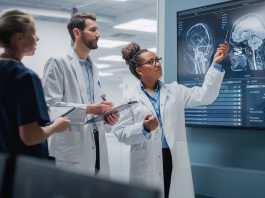A new study indicates that doctors may soon be able to use artificial intelligence (AI) to detect cancer in patients, allowing for earlier treatment.
Cancer remains one of the most challenging human diseases, with over 19 million cases and ten million deaths annually.
The evolutionary nature of cancer also makes it difficult to treat late-stage tumours.
The new paper is published in Biology Methods & Protocols.
Studying DNA bases to detect cancer
Genetic information is encoded in DNA by patterns of the four bases—denoted by A, T, G and C—that make up its structure.
Environmental changes outside the cell can modify some DNA bases by adding a methyl group, which contains millions of ‘methylation marks’.
Researchers have observed changes to these marks in early cancer development, meaning they could detect cancer early.
It’s possible to examine which bases in DNA are methylated in cancers and to what extent, compared to healthy tissue.
Identifying the specific DNA methylation signatures indicative of different cancer types is akin to searching for a needle in a haystack.
This is where the researchers involved in this study believe that AI can help detect the type of cancer a patient is suffering from.
Training AI modes to study DNA
Investigators from Cambridge University and Imperial College London trained an AI mode using a combination of machine and deep learning to examine DNA methylation patterns and detect cancer.
The AI mode successfully identified 13 types of cancer, including breast, liver, lung, and prostate, from non-cancerous tissue with 98.2% accuracy.
This model relies on tissue samples (not DNA fragments in blood) and would need additional training and testing on a more diverse collection of biopsy samples to be ready for clinical use.
The researchers here believe that an important aspect of this study was the use of an explainable and interpretable core AI model, which provided insights into the reasoning behind its predictions.
Identifying these unusual methylation patterns (potentially from biopsies) would allow healthcare providers to detect cancer early. This could potentially improve patient outcomes dramatically, as most cancers are treatable or curable if detected early enough.
“Computational methods such as this model, through better training on more varied data and rigorous testing in the clinic, will eventually provide AI models that can help doctors with early detection and screening of cancers,” concluded Shamith Samarajiwa, the study’s lead author.









